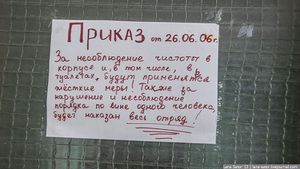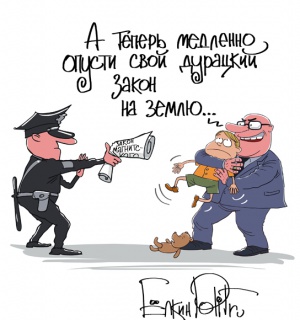Difference between revisions of "Hostage"
| Line 7: | Line 7: | ||
А теперь медленно опусти свой дурацкий закон на землю. (2012, December) |
А теперь медленно опусти свой дурацкий закон на землю. (2012, December) |
||
</ref>]] |
</ref>]] |
||
| + | In general, [[Hostage]] is principle of organization, when one cannot identify or catch persons who are believed to be guilty, and, therefore, punish the innocent people. This principle implies, either certain moral responsibility of the guilty person, or certain actions from the innocent people with respect to the guilty person. |
||
| − | [[Hostage]] means person or entity which is held by one of two belligerent parties to the other or seized as security for the carrying out of an agreement, or as a preventive measure against certain acts of war. However, in contemporary usage, it means someone who is seized by a criminal abductor in order to compel another party such as a relative, employer, law enforcement, or government to act, or refrain from acting, in a particular way, often under threat of serious physical harm to the hostage(s) after expiration of an ultimatum. |
+ | [[Hostage]] means also person or entity which is held by one of two belligerent parties to the other or seized as security for the carrying out of an agreement, or as a preventive measure against certain acts of war. However, in contemporary usage, it means someone who is seized by a criminal abductor in order to compel another party such as a relative, employer, law enforcement, or government to act, or refrain from acting, in a particular way, often under threat of serious physical harm to the hostage(s) after expiration of an ultimatum. |
<ref> |
<ref> |
||
http://en.wikipedia.org/wiki/Hostage |
http://en.wikipedia.org/wiki/Hostage |
||
Revision as of 20:39, 21 June 2013


In general, Hostage is principle of organization, when one cannot identify or catch persons who are believed to be guilty, and, therefore, punish the innocent people. This principle implies, either certain moral responsibility of the guilty person, or certain actions from the innocent people with respect to the guilty person.
Hostage means also person or entity which is held by one of two belligerent parties to the other or seized as security for the carrying out of an agreement, or as a preventive measure against certain acts of war. However, in contemporary usage, it means someone who is seized by a criminal abductor in order to compel another party such as a relative, employer, law enforcement, or government to act, or refrain from acting, in a particular way, often under threat of serious physical harm to the hostage(s) after expiration of an ultimatum. [3].
A person who seizes one or more hostages is known as a hostage-taker; if the hostages are present voluntarily, then the receiver is known as a host.
hostage-taking is qualified as act of terror, as it implied punishment of one person for actions of another person.
There are many publications about the AntiMagnitsky law, (Herod law, 2012) that prohibits adoption of Russian orphans to American families, as way to press the American administration for the Magnitsky bill. Similar use of Russian orphans to press the European administration is reported in year 2013 [4][5].
References
- ↑ http://lana-sator.livejournal.com/195712.html Lana Sator (lana_sator). Заброшенный лагерь "Юный Зиловец". Часть 1. 2013-06-21 13:53:00.
- ↑ http://imgur.com/w8xP4 А теперь медленно опусти свой дурацкий закон на землю. (2012, December)
- ↑ http://en.wikipedia.org/wiki/Hostage
- ↑ http://valdaiclub.com/russia_in_foreign_media/58020.html Neil Buckley and Jamie Smyth. Moscow uses Irish adoption threat to block use of Magnitsky list. 11:14 26/04/2013. Russia has threatened to block Irish adoptions of Russian children if the Dublin parliament adopts a US-style “Magnitsky List” imposing sanctions on Russian officials. The warning to Ireland, in a letter from Russia’s ambassador to the parliament’s foreign affairs and trade committee, is the first time Moscow has threatened similar action against another country.
- ↑ http://www.newsru.com/world/26apr2013/letter.html Москва пригрозила Дублину: если там примут свой "акт Магнитского", то тоже не увидят русских сирот. Пятница, 26 апреля 2013 г.